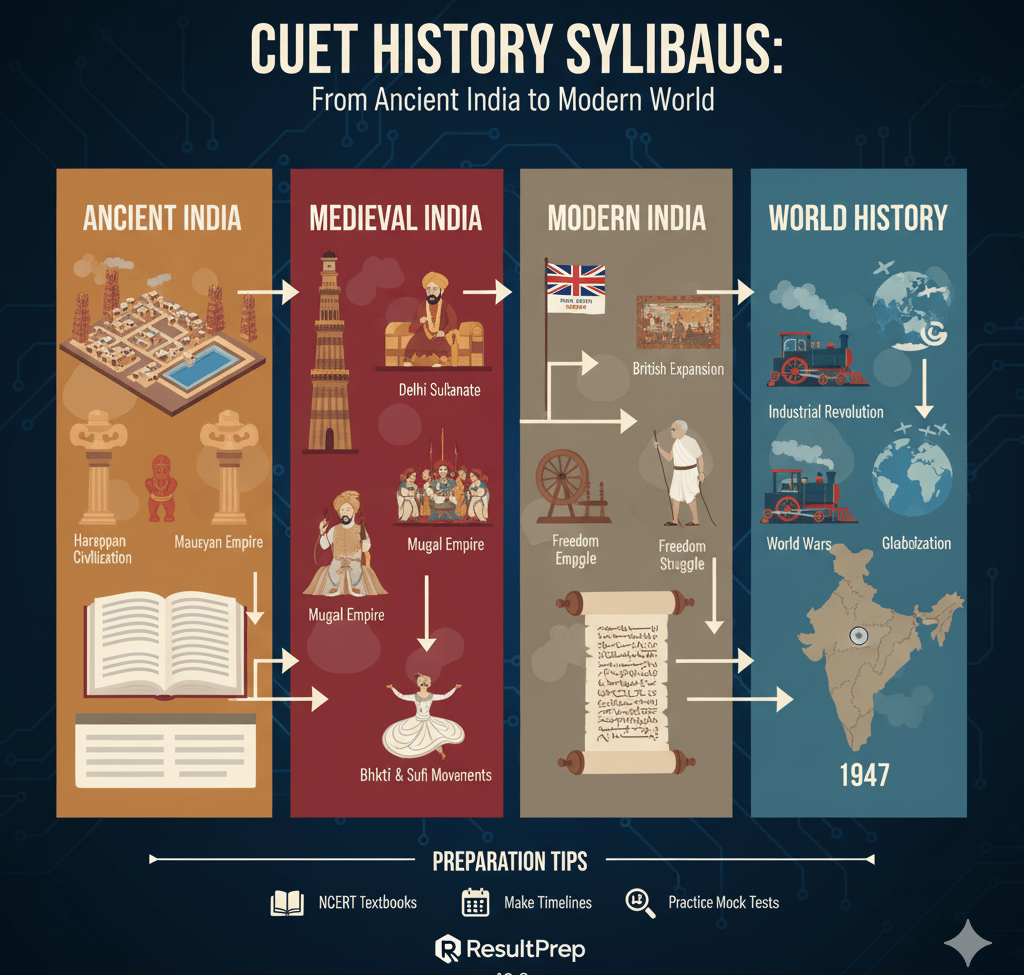🏛️ CUET History Syllabus Simplified: From Ancient India to the Modern World
Step into the past to secure your future! 📚✨ Explore the complete CUET History syllabus — from Harappan civilization to India’s freedom struggle and global transformations. Learn key topics, smart prep tips, and scoring strategies to ace the exam with confidence. Perfect for CUET aspirants aiming to master History the smart way! 🕰️💪
CUET
10/5/20253 min read


CUET History Syllabus: From Ancient India to Modern World
The Common University Entrance Test (CUET) has become the gateway to top central and state universities across India. Among the various subjects, History holds a special place for humanities students. Understanding the CUET History Syllabus is the first step toward effective preparation. This subject is not just about memorizing dates or events — it’s about connecting the evolution of societies, politics, and culture from Ancient India to the Modern World. This blog breaks down the complete CUET History syllabus, key topics, preparation tips, and strategies to help you master this subject.
Understanding the CUET History Syllabus
The CUET History syllabus is largely derived from the NCERT Class 12 History textbooks, ensuring that all students from different boards have a common standard of learning. It covers three broad areas: Ancient India, Medieval India, and Modern India. Each section is filled with fascinating insights into India’s evolution through time — from Harappan civilization to the Indian freedom struggle and beyond.
Ancient India: Early Societies and Kingdoms
The Ancient Indian section focuses on the earliest civilizations and the birth of organized societies. Key topics include:
The Harappan Civilization (Indus Valley Civilization): Town planning, trade systems, and art.
Vedic Period: Society, culture, and the rise of kingdoms.
Mauryan Empire: Administration under Ashoka and Chandragupta Maurya.
Gupta Age: The “Golden Age” of India — advancements in art, literature, science, and mathematics.
Religions and Philosophies: The rise of Buddhism, Jainism, and early Hindu traditions.
This section highlights how India developed complex political systems, philosophical traditions, and early cultural identities that shaped later eras.
Medieval India: Empires and Cultural Transformations
The Medieval period was marked by dynamic political shifts and cultural fusion. Important topics include:
Delhi Sultanate: Administration, architecture, and major dynasties — Slave, Khilji, Tughlaq, and Lodi.
Mughal Empire: Expansion, art, economy, and governance under emperors like Akbar, Jahangir, Shah Jahan, and Aurangzeb.
Regional Kingdoms: The rise of Vijayanagara and Bahmani kingdoms.
Bhakti and Sufi Movements: Social reform and spiritual diversity.
Students should focus on understanding not only political history but also the social and cultural interactions that defined medieval India.
Modern India: From Colonization to Independence
This is one of the most scoring and conceptually engaging parts of the CUET History syllabus. It focuses on the colonial impact on India and the freedom struggle.
Key areas include:
British Expansion in India: Policies of conquest and administration.
Economic Impact: Drain of wealth, deindustrialization, and changes in agriculture.
Social and Cultural Reform Movements: Contributions of Raja Ram Mohan Roy, Ishwar Chandra Vidyasagar, and others.
Freedom Struggle: Revolt of 1857, formation of the Indian National Congress, Non-Cooperation Movement, Civil Disobedience, and Quit India Movement.
India Post-1947: Partition, constitution framing, and early challenges of independent India.
This section connects historical events with modern Indian identity, helping students understand the evolution of governance and democracy.
World History: Modern Transformations
The CUET History syllabus also includes glimpses of world history, especially themes that influenced India and the modern world. Students study:
The Industrial Revolution and its global impact.
World Wars I and II: Causes, consequences, and role of the United Nations.
Colonialism and Nationalism: How colonized nations, including India, fought for freedom.
Cold War and Globalization: Post-war international relations and the emergence of new global powers.
This helps students link global events with Indian historical developments — a crucial analytical skill for both CUET and future studies.
Preparation Tips for CUET History
Follow NCERT Textbooks (Class 12) — Most CUET questions are based directly on NCERT content. Read each chapter thoroughly, especially timelines, maps, and case studies.
Make Chronological Notes — Create timelines for major events to connect periods smoothly.
Focus on Themes, Not Just Dates — CUET tests conceptual understanding rather than rote memory.
Practice Previous Year Questions and Mock Tests — This builds speed and accuracy.
Use Mnemonics and Flashcards — These make remembering facts and names easier.
Read About Historical Personalities — Understanding motivations and context makes history more interesting and helps in analytical questions.
Why History Matters for CUET
History is not just about the past — it teaches critical thinking, analytical reasoning, and contextual understanding, all of which are valuable skills for higher education and exams like CUET, CLAT, or UPSC. A strong grasp of history helps students interpret modern events, develop perspective, and write more coherent essays or answers in any subject.
Conclusion
The CUET History syllabus — spanning from Ancient India to the Modern World — offers an incredible journey through human progress, conflict, and transformation. Success in this subject requires more than memorization; it demands curiosity and connection-building across eras.
At ResultPrep Coaching, we simplify CUET History preparation with expert-led lectures, visual notes, and mock tests that bring historical events to life. By focusing on conceptual clarity and smart revision, students can confidently ace the History section and secure top university admissions.
📞 Call: 8970007497
🌐 Visit: www.resultprep.com
Prepare for the best results!
Achieve your goals with expert coaching and support from ResultPrep.
Contact us:
© 2025. All rights reserved.
Address:
GSS Complex, 2nd Floor,
16th Cross Rd, HMT Layout, Vidyaranyapura, Bengaluru, Karnataka- 560097
